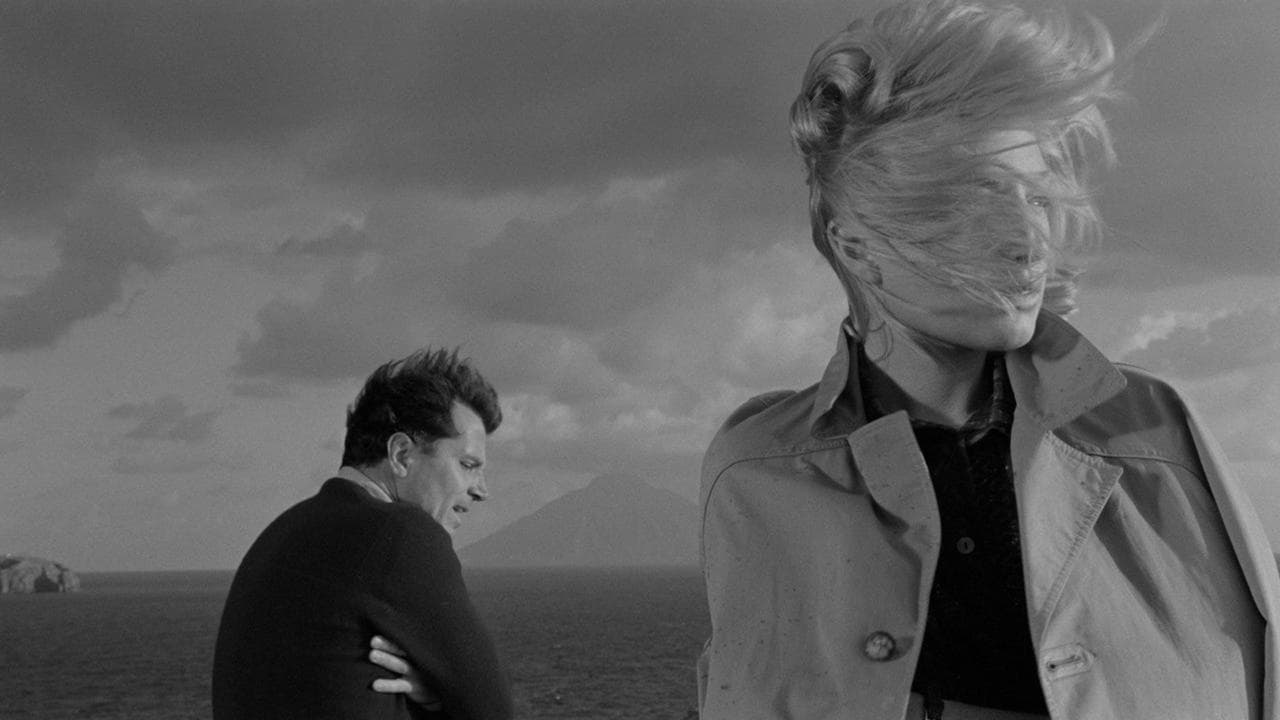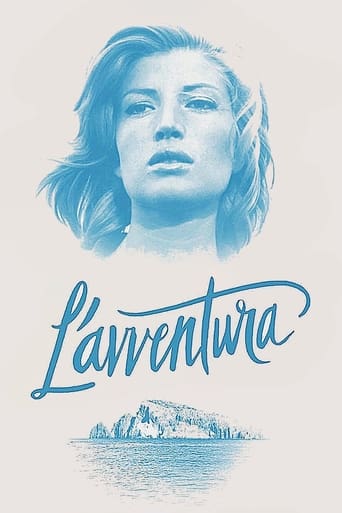



Excellent, a Must See
Am I Missing Something?
I think this is a new genre that they're all sort of working their way through it and haven't got all the kinks worked out yet but it's a genre that works for me.
View MoreOne of the best movies of the year! Incredible from the beginning to the end.
View MoreIf you have never seen the luminous Italian actress Monica Vitti in a film, you simply must rent this one. Imagine Faith Hill with a Neapolitan profile, a Catholic (as opposed to Protestant) guilt complex and an earthy, almost boyish exuberance. L'Avventura, translated in English to mean The Adventure, is the story of a woman (Vitti) who joins her best friend, her best friend's lover, and a gaggle of wealthy Italians on a boat trip near Sicily. The best friend mysteriously disappears during an excursion to a barren island in the Mediterranean. The remainder of the film involves Vitti's search for her friend, as clues point to the possibility that she left the island on a boat and is spotted, via missing-persons and newspaper reports, here and there on the mainland. Vitti is intermittently joined by the misplaced woman's lover (Gabriele Frezetti), with whom she falls in love against her better judgment.L'Avventura and La Dolce Vita were released in the same year and have similar themes: they both focus on the emptiness of the very wealthy and a fruitless search for sensual pleasure. Antonioni's film captures the milieu with a unique style, oddly framed camera angles, full depth of focus in every shot, a meandering pace and virtually no music. The film does not have a plot in the conventional sense, and to me seemed like two stories in one. Essentially, it is the study of a woman drowning in an emotionally bankrupt social strata. Lonely, gentle readers will no doubt see their own emotional bankruptcy reflected in this brilliant Italian masterpiece.
View MoreWhen this film was screened at the "Cannes Film Festival" in 1960, it was booed by members of the audience (Antonioni and Vitti even fled the theater). According to film critic and film professor Gene Youngblood, people booed during long sequences where, supposedly, nothing happened to further the film's plot. I understand why it had a rough start, because it's very easy to miss its deeper meaning. However, after looking up a couple essays, I now understand why it's as popular as it is.After a woman named Anna disappears while on a boating trip, her boyfriend, Sandro, attempts to find her. Once they make it back to the city, however, he soon forgets about her and falls in love with Claudia, one of her friends.I think the film's purpose is to have you ask the question: Why would Anna run away? This film uses the actions of the characters to answer this question. Shortly after she disappears, Sandro begins forcing himself on Claudia as they search for her on the island. At first, she shies away from his advances, but when they make it back to the city, she begins to fall in love with him as well, betraying her friend. Throughout the film, their relationship continues to grow to a point where Claudia confesses that she's afraid of Anna returning, because if she does, Sandro might return to her. She then finds Sandro making love to another woman in a hotel. These two scenes show the themes of this film at their finest as it shows how unfaithful both of them are to Anna. I also feel like the film's purpose isn't solely to show why Anna ran away, but also to create a recreation of their relationship since the ending shows Sandro cheating on Claudia as well as Anna. Then, you have the final scene where the two characters, presumably, realize why Anna left as they cry together on a bench.I've seen quite a few people bring up this interpretation, but I feel like there are a few other details which are also important to the film. The first scene happens shortly after they first notice Anna disappear. Once that happens, Sandro says that type of behavior is typical. This hints that Anna tried running away several times in the past. Another vital scene is while Claudia walks in the streets alone, every single man stares at her as she walks by. This could indicate that another reason why Anna ran away was because she hated the society she lived in as well as her friends. Also relative to Anna disliking her friends, when Claudia meets up with her boating friends in Palermo, nobody seems to take Anna's disappearance seriously except Claudia. This is all the more reason to believe that Anna disliked her friends. The most important detail, however, is Sandro's disaffection caused by his failure to maintain his career as an architect. How this affects him is shown in the scene where he spills ink on a students' architectural drawing. This is also shown when Claudia runs into a paint store to hide when she mistakes a woman walking by Sandro to be Anna. Once Sandro walks inside, he stops her from buying a can of paint, highlighting his disaffection towards architecture.I've seen a lot of people praise the cinematography. However, I'm mixed on the way it was shot. I loved the part of the film which took place on the island as it felt like a barren landscape. Not only did this make for some visually striking scenes such as Claudia observing the sun rising as she stepped out of a shack, but it also seemed foreboding and unrelenting. There was the constant feeling that if one of them were to step over a hill, they would be confronted by an endless array of rocks, lowering the chances that they'd be able to locate Anna. Once they got off the island, however, this feeling was gone and the cinematography lost a lot of the power it had during the first hour. There are probably good reasons for why not to have the rest of the film take place on the island, but the scenery is so good, I can't help but feel an absence from the film in terms of its visuals. There were a few instances where we would see barren landscapes outside of a city, but these shots didn't give me the same atmospheric feeling I felt in the first hour because the characters weren't particularly in the middle of them like they were while they stayed on the island. Despite the visual shortcomings of the latter parts of the film (the visuals may grow on me in the future though), I still appreciated the several stunning shots cinematographer Aldo Scavarda was able to capture on the island.In conclusion, this was a really good movie. Partly due to the visual aspect, it may not quite reach perfection for me, but I completely understand why it often makes "Best films of all time" lists since it's unique in the way of its deeper meaning. I can see my opinion of it increasing if I give it another viewing a few years down the road.
View MoreThis movie is a masterpiece, certainly, but as admirable as it is for its technical mastery and genre inversion, it somehow fails to entertain. This should not discourage anyone from watching it, they should simply know what they are getting into from the outset. More than anything, this is an experiment of film: testing new possibilities for the medium (a trend that Antonioni would follow in the next two installments in this trilogy, La Notte and L'Eclisse) and new methods of emotional manipulation. The first thing to notice is the camera- work and direction style. It is a truly beautiful film, jumping from extreme close-ups characterized by frenetic movement to wide overhead shots of an island or city in which one or two distant figures can be viewed etching out their paths like ants in the sand. It often distracts from the underlying story, especially in the later parts of the movie when the story itself has almost seemed to vanish along with the missing girl who acts as the focal point of the film, if it can be said to have one. The story itself offers some severe challenges to the audience. The first thirty minutes are devoted to establishing the mystery involved in the disappearance of Anna, the best friend of one of the film's protagonists and lover of the second. In a departure from the traditions of the genre, however, this mystery does not lead to a criminal conspiracy or hard-boiled investigation, but is instead followed by a series of the most mundane events imaginable. This is not to say that the lives of the two protagonists do not turn upside down, merely that this upheaval is internal rather than dependent upon external circumstances. As their half-hearted attempts to locate Anna lead them nowhere, Claudia and Sandro find themselves committing a more profound betrayal than if they had abandoned Anna to die outright: moving on with their lives. Rather than serving as the primary driver of the film, the mystery is covered up like an untreated wound festering just beneath the surface and infecting everything around it. Eventually the two characters reach a point in which the reappearance of Anna would no longer be the solution to a problem, but would in fact be the culmination of one. The final scene is striking in its ambiguity. Are we witnessing redemption, or the final stages of the fall from grace? Even the music seems to be unable to decide.
View MoreSome Italian people in the 1960's get on a boat and ride to an island in the Mediterranean Sea. While they're there, they notice that one of their party - a rather bitchy, unpleasant woman - has disappeared. They spend the rest of the movie (more than two hours) looking for her. They never find her. The End.I would like to review this movie but I don't know if I can come up with ten lines about it. As with Antonioni's "Eclipse", I found it insanely boring. The characters seemed emotionally half-dead, idiotic, and without direction or moral purpose. I guess the point of the film is to show that such people exist. But for the viewer it's a little like going to a restaurant and being served cold, day-old oatmeal with the chef coming out to say, "I made this to prove that such a thing exists." Thanks, but . . that's not what I was hoping to eat for dinner tonight. Or any other night.
View More